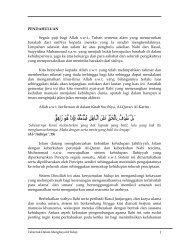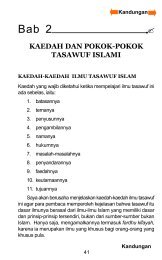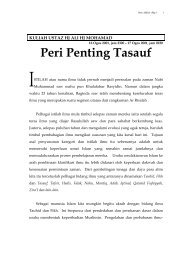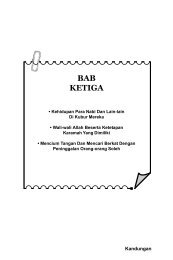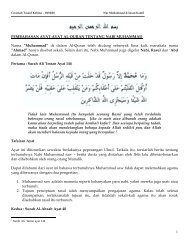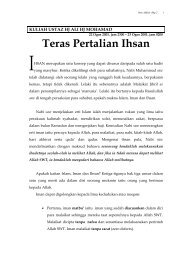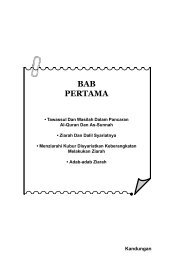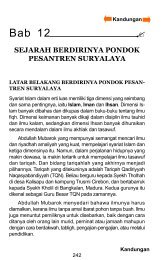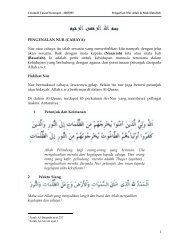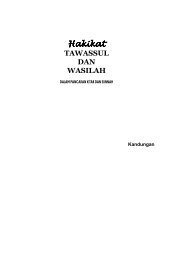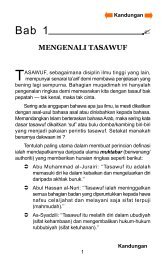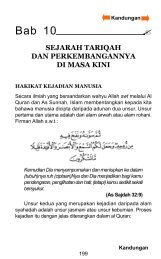inab3 cover front.psd - Khadijah Mosque
inab3 cover front.psd - Khadijah Mosque
inab3 cover front.psd - Khadijah Mosque
You also want an ePaper? Increase the reach of your titles
YUMPU automatically turns print PDFs into web optimized ePapers that Google loves.
account when discussing moderation, in<br />
Islam, it is determined based on the Holy<br />
Quran and the Sunnah.<br />
Islam commands Muslims to be moderate<br />
in practising the teachings of the religion.<br />
The teachings of Islam, as outlined in the<br />
Holy Quran and the Sunnah, advocate<br />
moderation in life. Extremism is actually the<br />
result of ignoring or going against the tenets<br />
of the religion.<br />
On the other hand, moderation in Islam<br />
does not mean ignoring its commandments<br />
such as praying (solat), fasting or wearing<br />
the headscarf for women.<br />
Moderation in Islam may be seen not only<br />
in the context of worldly life but also life in<br />
the Hereafter. Allah Almighty mentions this<br />
point in the Holy Quran,<br />
“And seek, with the (wealth) which Allah<br />
has bestowed on you, the Home of the<br />
Hereafter, nor forget your portion in this<br />
world: but do you good, as Allah has been<br />
good to you, and seek not (occasions for)<br />
mischief in the land: for Allah loves not<br />
those who do mischief.” (The Holy Quran<br />
28: 77)<br />
In order to understand moderation in Islam,<br />
it is necessary to fully understand the Islamic<br />
worldview and to understand the<br />
philosophy behind the teachings and<br />
practices. Some issues which require that<br />
prior understanding are; Why do Muslims<br />
fast? Why are Muslims required to <strong>cover</strong><br />
their aurat? Why is extra-marital sex<br />
prohibited even with mutual consent?<br />
It is also necessary to understand how the<br />
ulama derive rulings from Al-Quran and As-<br />
Sunnah. With an understanding of this<br />
process, one will be able to ascertain the<br />
extent and validity of their rulings. Without<br />
it, extremist tendencies may develop.<br />
On this basis, it can be seen that the<br />
concept and meaning of moderation in Islam<br />
overlaps significantly with that commonly<br />
used, save for slight differences.<br />
THE MEANING OF EXTREMISM<br />
ACCORDING TO THE HOLY QURAN<br />
& THE SUNNAH<br />
Islam Prohibits Extremism<br />
In essence, Islam guides towards<br />
moderation, away from extremism. This can<br />
be seen from the following arguments<br />
(dalil);<br />
1Allah commands that Muslims always<br />
pray for the straight and righteous path.<br />
Allah Almighty says:<br />
“Show us the straight way, the way of those<br />
on whom You have bestowed Your Grace,<br />
not those whose (portion) is wrath, and not<br />
those who go astray.” (The Holy Quran 1: 6 – 7)<br />
This verse teaches the Muslim ummah to<br />
distance themselves from two extreme<br />
groups, namely the group that neglects the<br />
teachings of the religion and the group that<br />
is extreme in practising it. Muslims recite this<br />
verse in every rakaat of every prayer. That<br />
is the extent to which Islam reminds its<br />
ummah to avoid extremism.<br />
2Islam prohibits its ummah from being<br />
extreme.<br />
Allah Almighty says:<br />
“These are the limits ordained by Allah;<br />
so do not transgress them, if any do<br />
transgress the limits ordained by Allah, such<br />
persons do wrong (to themselves as well as<br />
others).” (The Holy Quran 2: 229)<br />
This verse forbids Muslims from<br />
transgressing limits. It also alludes that<br />
extremism goes against the teachings of<br />
Islam.<br />
Allah Almighty says:<br />
“Do not commit excesses in your<br />
religion.” (The Holy Quran 4: 171, 5: 77)<br />
2<br />
Cited by Abdul Rahman b.Mu‘alla Al-Luwaihiq, Al-Ghuluw Fi Ad-Din Fi Hayat Al-Muslimin Al-<br />
Mu‘asirah, Muassasah Ar-Risalah, Beirut, 1992, pg. 65. See Sayid Qutb, Fi Zilal Al-Quran, Dar Asy-<br />
Syuruq, Beirut, 1403H, chapter 4, pg. 1931.<br />
Masjid <strong>Khadijah</strong> 43



